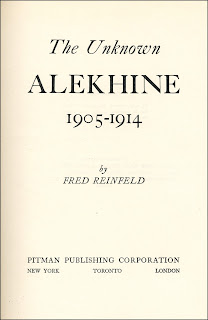Frank Hollings was the trading name of the bookseller and publisher James Francis Hollings Shepherd (1844-c1905), who opened his bookshop at 7, Great Turnstile, Holborn, London in 1892. The shop specialised in chess literature and issued frequent catalogues of chess works.
Betts 1-21 records Catalogue of Works on Chess, Draughts and Whist, No. 28, dated 1899, and this listed 342 items.
The business claimed, in 1910, to be The chief house in Europe for Chess Literature, Ancient and Modern and in the 1930's to have The largest stock of chess goods in Europe.
 |
| Catalogue circa 1910 |
 |
| Catalogue circa 1931 |
Betts 1-21 records Catalogue of Works on Chess, Draughts and Whist, No. 28, dated 1899, and this listed 342 items.
The business claimed, in 1910, to be The chief house in Europe for Chess Literature, Ancient and Modern and in the 1930's to have The largest stock of chess goods in Europe.
J.F.H. Shepherd died circa 1905 and the business was taken over by William Edward Redway, a fellow chess enthusiast, who soon began publishing works on the game. Comprehensive information regarding the proprietors of Frank Hollings, Shepherd and Redway, can be found at the Chess Notes website and here I am discussing the early chess publications produced by the firm up to 1920.
The first two chess books published were both by James Mortimer; The Chess Players' Pocket-Book and Manual of Openings, 15th edition, London, 1906 and The New Century Chess Book and Companion to the Chess Players' Pocket-Book, New and Enlarged Edition, London, 1906. The latter work included considerable analysis of the Rice Gambit and was regarded as the second edition of books in the Rice Gambit series.
Frank Hollings took over the publication of The Chess Players' Compendium, by William Cook, for the 4th edition, London 1907 and 5th edition, London 1910, and also published A Supplement to Cook's Chess Players' Compendium by Alfred Emery, London, 1910. This supplement included openings and games played since the publication of the first edition of the Compendium in 1902, and was incorporated into the fifth edition.
The business forged an association with Edward A. Michell and jointly published with him the very attractive productions The Series of First Class Games in three volumes, all edited by Leopold Hoffer:
No. 1 The Match and the Return Match Janovsky v Marshall, London, 1908, covering the two matches between these players in 1905 and 1908.
No. 2 The Championship Match Lasker v Tarrasch, London, 1908.
No. 3 Lasker v Schlechter, All Tournament and Match Games between these Masters up to and including the Championship Match, 1910, London, 1911.


Frank Hollings also became joint publisher, with the editor E.A.Michell, of The Year-Book of Chess for 1909, and this partnership continued with the Year-Books for 1910, 1911, and 1912. Frank Hollings was the sole publisher of the Year-Books for 1913, 1914 (now edited by M.W.Stevens), and the combined annual for 1915 and 1916 which was edited by W.H.Watts and A.W.Foster.

Further publications were One Hundred Pitfalls on the Chessboard, by Edwin Greig, London, 1910 and later editions,


Every Game Check Mate, by J.Douglas, London, 1915 (Betts 24-21 states 1915 but my copy has 1916 on the title page),

The Grand International Masters' Chess Tournament at St Petersburg, 1914, edited by W.H.Watts, published jointly with Printing Craft, London, 1914,


and the 16th edition of James Mortimer's The Chess Players' Handbook and Manual of the Openings, London, 1917, which was previously published as The Chess Players' Pocket-Book and Manual of the Openings.
Frank Hollings is also credited as publisher/distributor of Goh or Wei Chi by Horace F. Cheshire, Hastings, 1911. In a 1930's catalogue Frank Hollings describes this game as `The Probable Origin of Chess and Draughts´, however, H.J.R Murray states that this game is much more likely to be a derivative of chess in A History of Board-Games Other than Chess, Oxford, 1952, pages 36 and 90.
 | ||||
| Detail from Catalogue circa 1931
I hope to complete the chess publishing history of Frank Hollings in a future article.
© Michael Clapham 2016
|



























